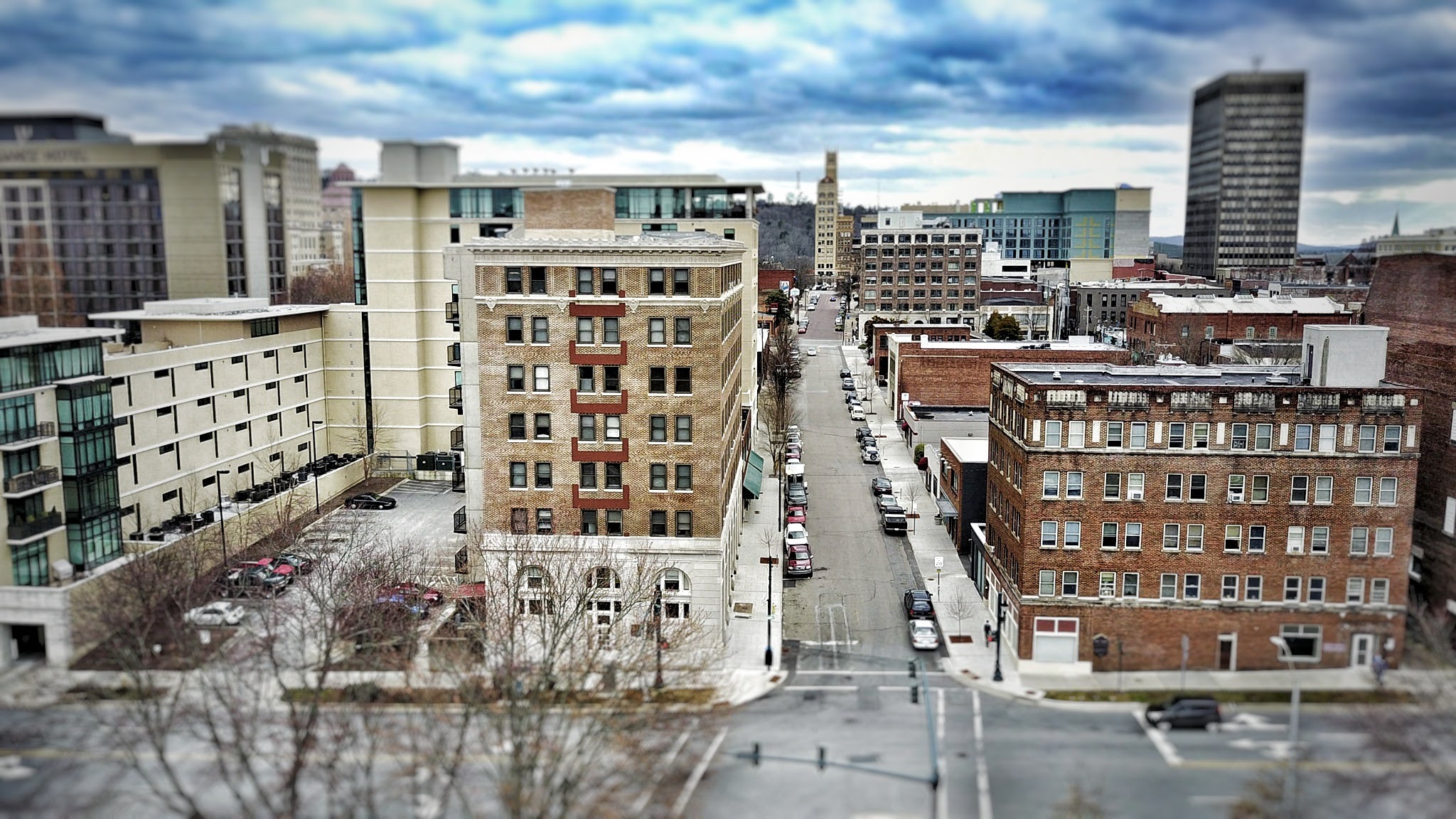As cities all over the country grapple with managing short-term rentals, does Asheville have an opportunity to be a leader in thoughtful regulations?
Asheville short-term rentals, or STRs, have been a local hot button topic for years now, with the city currently home to 1,172 Airbnb listings and recording the highest percentage of Airbnbs per local housing stock at 3.56% according to SmartAsset. Yet, since only homestays are permitted within city limits, a majority of Asheville’s Airbnb listings are owner-occupied, with guests allowed to rent up to two rooms in these homes. And throughout North Carolina, Airbnb collects an occupancy tax from hosts—just like they do with hotels—at a rate of 1-8%, with Asheville’s being 6%. Comparatively, New Orleans is about four times the size of Asheville and has about five times as many Airbnb listings, with 6,508 of them, which eats up 2.4% of available housing.
So where does the money that’s collected go? The Tourism Development Authority dedicates ¼ of those funds “dedicated to the Tourism Product Development Fund (TPDF), which has awarded $44 million to community projects that improve the quality of life in the Asheville area—parks, theaters, museums, historic sites, sports fields, arts development, greenways, and supporting infrastructure. Of the $44 million in grants that have been awarded since the TPDF’s inception, $22 million has gone, according to Stephanie Brown, President, and CEO of Explore Asheville, directly to City of Asheville-owned assets for projects such as the renovation of the U.S. Cellular Center, enhancements at the Western North Carolina Nature Center, and improvements to the River Arts District.”
Opponents of the banning of Airbnbs question why hoteliers can rent out whole spaces but not to locals who want to capitalize on Asheville’s massive tourism industry. “The biggest factor is the impact short-term rentals make on our housing market,” explains Mayor Esther Manheimer. “We heard with downtown development what was happening was that condos were coming in and marketing them as short-term rentals, and they would manage and rent it for you and it would become an investment property for you, pushing up the cost of real estate for everyone. What we’re trying to do is maintain affordability by not allowing the long-term rental market to be eroded. Think about how many thousands of rentals would come off the market—it would be severe,” she adds.
Yet, we’d be remiss not to look at Asheville’s history as a tourism destination. Boarding houses, gentleman’s quarters, guest cottages, and the city’s reputation as a place of healing and wellness has been going strong for over 100 years. Asheville residents have long welcomed tourists into their homes and rentals, so does banning full-house Airbnb rentals fit with Asheville’s history?
Many folks, like Joseph Minicozzi, owner of Urban3, a consulting firm specializing in land value economics, property and retail tax analysis, and community design, doesn’t believe so. “Isolating [an STR] as different from a hotel room in a commercial district seems arbitrary to me,” he explains. “I don’t think it’d stand up in court. The beauty of Downtown’s zoning is that it never fussed about building ‘use’ and that helped downtown revitalize.”
Realtor Elizabeth Putnam, of Mosaic Realty, also feels there are opportunities for short-term rentals that do not impact Asheville’s affordable housing crisis. “These are houses in the surrounding mountains or outlying areas of Asheville in the $600,000+ range. Most of these individuals are looking to do high-end rentals like what you would see at the beach. This price point does not impact the affordable housing shortage, and I believe should be allowed. The city rule currently is any house in the city limits of Asheville cannot do STR unless looking at Homestay. I think that is too stringent and should be loosened.”
Richard Whitney, President of Whitney Commercial Real Estate Services, echoes Putnam’s concerns about Asheville short-term rentals. “It’s wrong for individuals and small business owners in the CBD [commercial business district] to be banned from the short-term rental business. It’s not fair that big business [such as hotel chains] should have the entire sector of our economy while driving the little man out of the market. It feels very un-American to me,” Whitney says. David Ross, owner of Falcon Construction and graduate of Warren Wilson College, started his company in 2003 and also thinks hotel conglomerates shouldn’t be able to reap in so much of the tourism dollars. “I personally do not agree that short-term rentals should have been banned downtown. I believe it gives an unfair advantage to large hotel groups and away from the local building owners,” he explains.
Yet, Sue Robbins, former chair of the DARN (Downtown Asheville Residential Neighbors) steering committee, doesn’t think comparisons between hotels and STRs should be such a large part of this conversation. “I think there is a major difference between hotels and short-term rentals. STRs take units originally designed to be residences and turn them into virtual hotel rooms. The proliferation of STRs downtown before the ban contributed to the lack of affordable housing.
“One example is Carolina Way. It used to be occupied by artists and downtown workers. With the tourism boom, units were bought up by investors who care little about the quality of life downtown and may not even live in Asheville. These owners can make a lot more money on an Asheville short term rental than by leasing to a full-time resident—hence goodbye, affordable rentals, hello tourists. Also, City Council and the Downtown Commission are both in favor of increasing the number of actual residents in the CBD—could never happen if STRs were allowed. If you read the paper in any major tourist city anywhere, you can’t miss the articles on over-tourism and the problems caused by STRs.”
Robbins’ point of Airbnbs increasing costs of affordable longer-term rentals has support in the January 2019 study, “The Economic Costs and Benefits of Airbnb.” It reveals how “high-quality studies indicate that Airbnb introduction and expansion in New York City, for example, may have raised average rents by nearly $400 annually for city residents.” Yet, that same study acquiesces on a key point, noting, “One well-advertised potential benefit of Airbnb is the extra economic activity that might result if the rise of Airbnb spurs an increase in visitors to a city or town. Besides the income generated by Airbnb property owners, income might be generated by these visitors as they spend money at restaurants or in grocery stores or on other activities.”

Of course, Airbnb argues that their platform helps regular people be able to afford to remain in urban centers where housing prices and rents have risen to unattainable rates for many and help hosts be prepared and able to survive should another recession and housing crisis should hit reminiscent of 2008. “In The Affordable Housing Crisis, Explained,” published by Curbed, summarizes what factors have contributed to rising housing costs: “The foreclosure crisis of 2008 hit Generation X hardest, and many in and around middle age had their credit damaged and their savings wiped. But after 10 years of repairing their credit in the rental market, some Gen Xers have been keen to return to home ownership. This has added demand in the housing market from an age group that would historically already own homes. What’s more, the continued presence of Gen Xers in the rental market is driving down rental supply and driving up rents.”
Two other hot-button issues related to Asheville short-term rentals revolve around banning the use of ADUs, or auxiliary dwelling units, such as an apartment above a garage or carriage house; and the kitchen rule, which does not permit the rental area of someone’s homestay to have a separate kitchen. Fighting these restrictions is one of the reasons that Asheville’s Homestay Network recently started hosting monthly meetings in order to represent the 800+ homestay permit holders and influence rulemaking, share best practices, leverage local businesses, and improve Airbnb hosts’ standing in the community.
Homestay Network’s local spokesperson Jackson Tierney has been heavily involved in working alongside other Asheville short-term rental hosts for the past five years and was appointed by the city to the ADU Task Force in 2018. He had been working hard to open communications between hosts and the city and stakeholders before the council met about these and other proposed restrictions on August 22, 2019. “On June 16, of last year,” explains Tierney, “we sent out a summary of the kitchen rule and how that is going to impact homestay hosts going forward and those who don’t have a permit yet. People were up in arms and went to the next Planning and Economic Development meeting–120+ people showed up and it was pandemonium; kids were running around, people were calling out…then we went to the next one and 80+ people came. It was just a mess, then on top of all that, the city was looking at 10 additional restrictions they wanted to apply to Homestay permit owners. We were just beside ourselves, so we asked the city to put a stay on these rules until we could put together a stakeholder meeting. Affordable housing advocates, real estate people, reps from Airbnb, and several others. The city really for the first time started to recognize that we are now a united group instead of a bunch of individual voices.”
Tierney has also built connections with other Homestay Networks in Portland, Oregon, New Orleans, and Denver to learn from their efforts and stay in front of other potential restrictions. Tierney has gleaned from Portland’s group for hosts that there’s been a 50% attrition rate for ADUs that served as STRs and then converted to long-term rentals, so allowing ADUs to be used as short-term rentals could be a wise move by the city. Tierney is also pushing for three additional changes to the rules: allow hosts to be away from home a limited number of nights while guests are in the home, and allow for co-hosting to encourage more renters to be hosts. He also believes that platforms like Airbnb and VRBO should work with the city to share data to make sure all hosts are in compliance: “In the Solutions Cafe we had in December, this was actually the highest vote-getter of actions to take. The next move of the city is to try to see if they can impose a similar enforcement mechanism that San Francisco implemented a few years ago, and that is, find the platforms for advertising listings that do not have a permit.”
Derek Allen, a local attorney at Ward and Smith specializing in land use, thinks Asheville’s smaller size compared to other cities that have struggled with regulating Airbnbs, such as New York and San Francisco, is actually an asset when it comes to dealing with Asheville short-term rentals. Notes Allen, “We’re not so big a community that we can’t come up with tailored rules that allow for reasonable use that would let residents of our city profit off the tourism in our city. I’m not saying open it completely up. Instead, issue personal licenses and permits to individuals and run it as a pilot program—only give 100 of these in the first year, and do it as a lottery system and it is only good for one year. If it works, boom, we have a model to roll out and phase it in. Constitutionally, this ban is on shaky grounds and is hard to really enforce, and it encourages folks to game the system. With a pilot program like this, you incentivize self-policing.”
***
One thing is for sure: the sharing economy is here to stay—in fact, in July 2017, Asheville business publication Capital at Play published a detailed report titled “The Sharing Economy” on this new reality, and cities and hosts will continue to butt heads for the foreseeable future. Airbnb reports that they have five million hosts globally who make on average $6,100 a year. In a conversation with CNBC, Airbnb’s head of global policy, Chris Lehane, said, “I’ve yet to see a program being run by any mayor, any elected official in this time of economic inequality that’s generating $6,100 for a typical middle-class family. All without the expenditure of a single taxpayer dollar,” he told CNBC. “That is what Airbnb is about at its core. Trying to use technology to create economic empowerment.”




